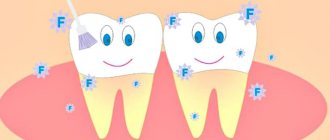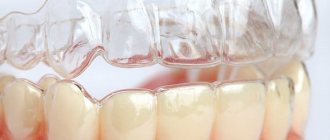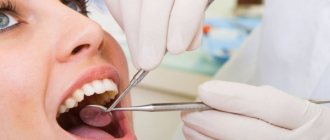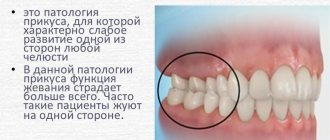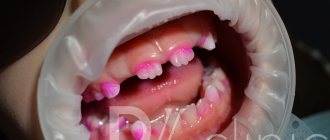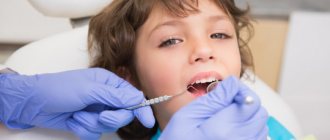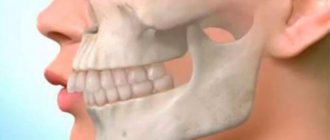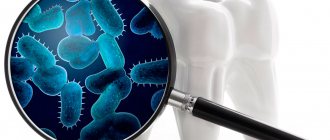When metabolic processes in dental tissues are disrupted, poor enamel on a child’s teeth is sometimes observed. The main reason for the development of such a pathology in a baby is an infectious or viral disease suffered by a pregnant woman during the period of bearing a child, when the formation of tooth buds occurs. You should not ignore such a problem as weak tooth enamel in children. It is recommended to consult a pediatric dentist for timely treatment of baby teeth to prevent their destruction.
Features of development
Hypoplasia of dental enamel in primary teeth is a pathology that develops as a result of disruption of metabolic processes in developing chewing units. When this disease develops in a child, the condition of the tooth enamel deteriorates, it becomes thinner, cracks appear on it, and the protective layer is often exposed to carious lesions. To prevent unpleasant consequences, it is recommended to strengthen tooth enamel in children. For this purpose, various methods are used in dental practice.
It is important to contact a specialist in a timely manner if any problems arise with the protective layer of the dentition, since tooth enamel does not strengthen on its own and cannot regenerate on its own.
Strengthening gums
Along with taking care of the teeth themselves, it is important to take care of the condition of the child’s gums, because their diseases can also lead to tooth damage and even tooth loss. To keep children's gums healthy, the following substances are needed:
- Vitamin C.
Its lack negatively affects the condition of the gums, causing them to bleed and become ulcerative. As a result, the child develops bad breath and teeth become loose. - B vitamins.
Among them, B12, B1, B6 and B2 are the most important for gum health, since their deficiency provokes an inflammatory process in the mouth. - Vitamin E.
If there is a lack of it, the gums become inflamed, and their damage heals worse. - Vitamin RR.
It protects the gums from the appearance of gingivitis, as well as stomatitis. - Vitamin K.
A sufficient amount of it prevents bleeding gums.
Inflammation of the gums in a child can be avoided by taking vitamin complexes to strengthen teeth and gums
Why does the protective layer suffer?
Thinning of tooth enamel occurs when metabolic processes in the body are disrupted, as a result of which the tissues of growing teeth do not receive the required amount of protein and mineral structures. This phenomenon can occur in the prenatal period, in the age category from six months to one and a half years, when mammary and permanent units are formed and mineralized.
Pathologies in the development of milk units are caused by the following factors:
- Complicated pregnancy. These include: pathologies - severe toxicosis, Rh conflict;
- diseases suffered during the period of bearing a baby - toxoplasmosis, rubella, diseases of the endocrine system, influenza, syphilis, HIV infection; The expectant mother is taking antibacterial drugs or hormonal drugs.
Chronic childhood diseases - infections, diseases of the digestive system, rickets, dysfunction in brain activity, various forms of dystrophy.
Insufficient amounts of fluoride and calcium in the body also negatively affect the condition of the protective layer of the dentition. External factors can also cause a deterioration in the condition of tooth enamel - eating a lot of sweets, sour foods, lack of proper hygiene, bad habits - biting nails, pens or pencils, as well as bruxism, in which constant friction worsens the condition of the teeth.
The pediatric dentist will tell you how to strengthen your teeth enamel after a preliminary examination and examination. It is important to establish the cause of the problem and eliminate it. Only after this the dental treatment performed will be effective.
Simple fluoridation procedure
How a child’s tooth enamel can be strengthened is determined by the doctor after an examination in each specific case. The most common procedure that strengthens the surface of chewing units is fluoridation. It is offered in many dental clinics. Fluoride is one of the most important trace elements required for proper growth and development of teeth. The fluoridation procedure involves the use of special fluorine compounds - fluorides, which reduce the solubility of enamel, reduce the degree of acid production by bacteria, and help restore the protective layer.
A qualified specialist will assess the condition of the child’s dental surface and, if necessary, decide what to do in a particular case and how to strengthen the tooth enamel. Simple fluoridation is carried out in two ways:
- The enamel on the teeth is coated with fluoride-containing varnish. The plaque is first removed, after which varnish is applied to the surface and dried under a halogen lamp. To achieve maximum effect, it is recommended to carry out this procedure immediately after the baby teeth have erupted. Repeat it once every six months.
- Using cap. The dentist makes impressions in each specific case and fills them with fluoride. After which the impression is placed on the surface of the dentition. The duration of the procedure is 15 minutes. To achieve maximum effect, at least 10 procedures should be performed.
Tooth enamel and its description
If you take a dental unit and describe its structure, the enamel will be the hardest of the tissues. The main function of enamel is protection; it should protect dentin, as well as pulp, from the action of external irritants. With this main task, enamel is still a fragile layer. This can be expressed as chips, but the most dangerous thing for enamel is caries.
The enamel does not have a uniform thickness on the crown of the tooth. The crown is the visible part of the tooth that is located above the gum. It is thinnest in the area of the tooth neck. As for color, it is translucent, can be white, yellowish, grayish. The color is explained by both the thickness of the layer and the shade of the dentin itself, what is underneath.
If the enamel in some areas has lost its transparency, this is the first symptom of hypermineralization. You need to see a doctor who will coordinate your actions and determine the extent of the problem.
Features of deep fluoridation
The most effective method of restoring enamel is the deep fluoridation procedure. This is an enhanced technique for restoring the surface of the protective layer. To carry out the deep fluoridation procedure, the dentist performs the following manipulations:
- teeth and interdental space are thoroughly cleaned of plaque and stone and dried;
- a preparation containing magnesium salt, copper and fluorides is applied, then it is dried; the enamel is treated with calcium hydroxide.
During these manipulations, the penetration of the molecules of the substances used is ensured deep into the micropores of the protective layer, thereby ensuring its effective remineralization and long-term bactericidal effect. It is recommended to carry out this procedure at least once a year (in the worst case, once every year and a half).
It is important to systematically strengthen the child’s protective layer from the beginning of the eruption of baby teeth. The fluoridation procedure is excellent and does not damage the enamel.
Preventive actions
To preserve the beauty of a child’s smile, it is very important to teach him from an early age how to properly care for it. By turning to dentistry, you can strengthen and restore the surface of the tooth. And you can prevent the development of all kinds of problems with the help of proper prevention. Careful oral hygiene is important. It is recommended to use a brush with medium-hard bristles and fluoride toothpaste approved for children. Dental cleaning should be done daily, twice a day. All movements must be circular and performed for at least three minutes. Horizontal movements can injure the surface; this must be explained to the child. He must carry out cleaning procedures correctly.
An important condition for maintaining dental health is maintaining proper nutrition. The diet should be rich in foods that contain calcium and fluorine - fermented milk products, different types of nuts - almonds, hazelnuts, walnuts, legumes - peas, beans, poultry (chicken, turkey), hard cheeses, oatmeal and buckwheat. cereals If necessary, take a course of multivitamin complexes prescribed by your doctor. Be sure to visit a pediatric dentist with your child at least once every six months, who will detect any developmental pathologies and, if necessary, carry out fluoridation or other types of treatment.
Today we want to talk about our youngest patients - babies in the first 3 years of life. Teething is a whole ordeal for many of them, and little ones with a sweet tooth are not always able to keep their milk teeth healthy.
Our material today is about how to strengthen a child’s teeth, what to do so that milk teeth are replaced by even and healthy permanent teeth.
The use of pastes and gels with strengthening components
With fluoride
At home, you can use pastes that strengthen tooth enamel. Formulations containing amino fluorides or sodium fluoride are best suited for these purposes. When fluoride penetrates the enamel, its molecules combine with the hydroxyapatite of which it is composed and form a strong compound that is resistant to the negative effects of cariogenic bacteria and acids.
For daily use, prophylactic pastes with fluoride up to 1000 ppm are suitable. If your teeth are already problematic and require a course of treatment procedures, then it is better to use pastes containing 1000-1500 ppm fluoride, since such products have a higher remineralizing activity. However, if the first type of paste can be used by adults with virtually no fear for their health, then the second type, where the fluoride content is increased, can only be used in courses and in consultation with a doctor, otherwise fluorosis may develop.
Fluoride toothpaste options: Curaprox Enzycal, Colgate Elmex, LACALUT Sensitive. Gels for strengthening tooth enamel with amino fluorides, sodium fluoride: LACALUT fluor Gel, Topical APF Gel.
Important! Calcium and fluorine are equally important for the strength of hard tissues. Preparations based on them are quite effective1 in influencing the processes of remineralization and strengthening of enamel, but if they are used together, they neutralize each other’s effects. Therefore, fluoride and calcium are rarely added to pastes at the same time, and doctors advise using one or the other alternately.
With hydroxyapatite
Pastes with hydroxyapatite have excellent remineralizing activity and help strengthen enamel at home. Medical hydroxyapatite is easily integrated into the crystal lattice of hard tissues, is able to eliminate caries in the stain stage and increased sensitivity, fills the smallest microcracks and creates a smooth surface on which plaque and bacteria cannot catch. Paste options with hydroxyapatite: Biorepair Total Protection, Vivax.
With amorphous calcium phosphate and glycerophosphate
These substances form a film on the surface of the enamel that protects teeth from the negative effects of external factors and replenishes the balance of minerals in hard tissues. Be careful, because products containing this substance are not suitable for people who are allergic to milk protein. A paste option with amorphous calcium is Tooth Mousse, with glycerophosphate - ROCS Medical Minerals gel.
With natural plant extracts
Strengthening pastes may contain not only sodium fluoride or calcium, but also natural ingredients: chamomile, thyme, rosemary, yarrow, propolis, sage, vitamin E, lavender. The purpose of such products is not only to protect and restore hard tissues, but also to normalize the condition of the gums and have an anti-inflammatory effect. Options for such pastes: Silca Herbal Complete, SPLAT “Lavandasept”.
Selection of vitamin and mineral complexes
How else can you strengthen tooth enamel in an adult? You can take a course of vitamins, for example, those listed in the table below.
| Name of the drug | Description | Price |
| "Calcium D-3 Nycomed" | Suitable for adults, and also recommended for strengthening tooth enamel in a child if he is 3-5 years old. There are options on sale with strawberry and watermelon, mint, and orange flavors. | From 350 rubles |
| "Asepta" with coral calcium | Improves the condition of periodontal tissues and teeth, helps reduce gum bleeding during gingivitis and periodontitis. Contains not only coral calcium, but also coenzyme Q10, vitamins D3, A C, B3, B6 and B9. The complex is approved for use from 14 years of age | From 400 rubles |
| “Mountain calcium D3 with mumiyo” from Evalar | Strengthens bone tissue, suitable for men and women | From 180 rubles |
| "Magnesium, calcium, D3" from Doppelhertz Active | These are effervescent tablets with orange or passion fruit flavor. Not only strengthen bone structures, but also support the cardiovascular system | From 280 rubles |
In general, almost every manufacturer produces calcium complexes today, so anyone can choose one that suits them based on price, composition and properties. Why does calcium go hand in hand with vitamin D3 in many preparations? The fact is that this particular vitamin is necessary for its full absorption, otherwise you may not get the effect you expect.
Growth of baby teeth: important points
The time of appearance of the first teeth is individual for all children and to some extent depends on heredity. Children react to this differently: one begins to get nervous long before the first tooth appears, while the other goes through this process absolutely painlessly.
The appearance of the first teeth
Around seven months the baby's first tooth appears. The process of teething begins a couple of months before. The child begins to bite everything, put it in his mouth, he drools, he whines, and is capricious.
Try to help your baby go through this difficult process, which will last up to about two years. At this time, the baby should have twenty teeth.
Teething reduces immunity to some extent, so the child may develop a fever. If suddenly it jumps above 38 degrees, you need to consult a doctor.
The first teeth to appear are the molars. Typically, a one-year-old child already has eight front teeth. And then, over the course of several months, six more teeth erupt one after another. Between the incisors and molars there is space for fangs; they will appear closer to two years.
Strengthening baby teeth
The last teeth to grow are the four molars. During this period, the child will constantly chew or gnaw something, and additional gum massage will be required. Buy several special rubber rings or toys that are comfortable for your child to hold in his hands. Pay close attention to what and how your baby chews. Some children manage to chew their entire crib. Be vigilant and maintain good hygiene.
A child’s teeth need to be strengthened in the womb, because they are formed before birth. Mom needs to monitor her diet very carefully so that it contains the required amount of calcium, phosphorus, vitamins A, D3, C, and B vitamins.
Vitamin complexes for teeth
If parents want to supplement their children's diet with supplements that contain vitamins and minerals important for teeth, they often choose vitamins with calcium, as well as phosphorus. The most popular complexes are:
- Vitamins Calcium+.
This supplement is produced in the form of delicious gummy bears, which are given to children from 3 years of age. The drug includes vitamin D, calcium and phosphorus, so it has a positive effect on the condition of teeth.
- Alphabet
. Vitamins that strengthen teeth and gum mucosa are present in all complexes of this brand. Their advantage is considered to be the division of nutrients into several daily doses, each of which combines substances that are better absorbed together. For the child's teeth, the Alphabet Our Baby vitamins contain sachets with calcium and vitamins B5, B12, D and B9. Other Alphabet complexes contain yellow or white tablets, the basis of which are calcium and vitamin D3. They also contain vitamins K, B12, B5, H, B9 and chromium.
- Multi-tabs Baby Calcium+.
This multivitamin complex for children 2-7 years of age provides the child with 13 vitamin compounds, as well as 7 minerals, including some important for dental tissue.
- Complivit Calcium D3.
These orange-flavored chewable tablets for children over three years of age contain vitamin D3 and calcium carbonate.
To strengthen your child’s teeth, you can also give complexes Pikovit, Vitrum, Supradin, Kinder biovital, Kalcemin and others, paying attention to the content of vitamins A, E, D, group B and other substances useful for teeth and gums.
Children more often than others use sweets in their daily diet, which in turn negatively affects the health of their teeth. Many parents wonder if the situation is improving.
“Permanent” teeth in a child
After six years, baby teeth are replaced by “permanent” teeth. Permanent teeth are formed in the first year of a child’s life.
Some children are prescribed vitamins C and D in concentrated form.
Once teeth emerge, they need to be cared for regularly. Starting from the age of two, a child, playing and repeating after his parents, begins to brush his teeth. Buy your baby a baby brush and toothpaste. Baby teeth require regular care, just like permanent teeth. As children begin to eat candy and other sweets, baby teeth are destroyed quite easily and quickly. Therefore, brushing your teeth at night is an unquestioning ritual.
Baby teeth are replaced with permanent ones in the same order as they grow. It happens that teeth grow crooked or displaced, and in order not to miss the moment and correct them in time, you should visit
Teeth are destroyed when tooth enamel cannot protect them from external influences. Tooth enamel can withstand enormous loads. However, its big disadvantage is that it does not recover. Once the tooth enamel is damaged, the tooth remains unprotected. This often leads to high sensitivity - when cold, hot and sour foods come into contact with open nerve tubules. Before you learn about ways to restore damaged teeth, we will tell you about the reasons that could lead to this condition.
Using toothpaste to strengthen enamel
This is what probably comes to everyone’s mind - it’s worth buying the right toothpaste, with a therapeutic effect. If the patient has teeth with high sensitivity, then the paste should only be of low abrasiveness. It must contain some kind of active component, for example, potassium chloride. The paste should contain an increased dosage of fluorides.
On the modern market you can find toothpastes containing two active substances at once, which reduce the sensitivity of the teeth. The paste also contains two substances that directly strengthen the enamel. One substance remains on the teeth after brushing and then penetrates directly into the enamel. This is amino fluoride - an expensive component; if it is included in the paste, its price will be high.
Why do teeth deteriorate?
This is not a complete list of reasons why teeth begin to crumble and decay.
- Improper and insufficient care is one of the main causes of tooth decay. This includes not only brushing your teeth every day, but also visiting a doctor in a timely manner. After all, it is much easier to remove one tiny point of caries than to treat 2 or 3 completely diseased teeth. And if you see a doctor on time, the spread of caries can be avoided.
- Often teeth deteriorate due to an unbalanced diet. If the diet is low in calcium and fluoride, the teeth are the first to suffer.
- Often bad teeth are a hereditary factor. If your parents and relatives' teeth are destroyed very often, you need to take care of your own more carefully.
- Some problems in the gastrointestinal tract are associated with frequent releases of acid into the oral cavity. Since gastric juice is very caustic, it leads to tooth decay in a short time.
- Some people grind their teeth during stressful situations or in their sleep. Such grinding often leads to severe destruction of the enamel and the tooth bone itself.
- Some medications, such as aspirin, can also destroy tooth enamel.
- If a person has various problems with saliva production, the lack of this secretion can lead to dry teeth, which makes them vulnerable to various bacteria and microbes.
- Tooth decay is caused by consuming large amounts of soda, acidic foods, coffee, and desserts.
The first symptom of tooth decay is pain when eating hot or cold food; sometimes teeth can even hurt from cold air. Then the tooth changes color - becomes gray or yellow. This is especially noticeable in contrast to healthy teeth. Then chips, cracks, cavities with caries appear. After this, the tooth simply begins to crumble and break even with slight pressure. To avoid this, you need to take care of your teeth from a young age.
Recently, caries has become younger and today can be observed even in one-year-old children. This is due to many reasons. Some parents do not take action when a 4-5 year old child develops caries, because they believe that there is no need to treat baby teeth, since they will soon be replaced by molars. However, this is a big mistake. A carious tooth often infects neighboring ones. And if at this moment the molar begins to grow, the caries transfers to the new tooth, which should serve the baby for the rest of his life. Additionally, untreated teeth often alter the growth of a healthy tooth, causing it to grow crooked. In addition, caries in the oral cavity is a source of infection, which can cause persistent tonsillitis and other inflammations in the oral cavity. Parents often wonder why their child gets sick so often, and the reason lies in caries.
Therefore, it is very important to take care of your child’s teeth – even if they are temporary and will soon change. From the age of one year, when the baby has at least 8 teeth, you need to start brushing them. First, it should be a small silicone brush, which is put on the mother’s finger, and then her own brush with baby paste. You also need to limit your sugar intake - it is very harmful to the child’s body. After milk, sour and sweet foods, be sure to rinse your mouth with clean water, especially before bed. Don't let your child fall asleep after a bottle of milk - lactic acid literally destroys tooth enamel.
Be sure to pay attention to your child's nutrition. His diet should contain a lot of dairy products - cottage cheese, milk, kefir. They have a lot of calcium. Let your baby chew peeled apples and carrots - all this strengthens his teeth. Strawberries, fish and seafood, parsley and green tea are good for dental health.
If your child’s teeth have already begun to decay, you should definitely show your baby to a doctor. He may suggest treatments to protect your teeth from further decay. For example, fluoridation is the coating of teeth with a protective layer of fluoride. In case of deep damage, you can do silvering - cover the teeth with silver nitrate, which will stop the destruction process. The only negative is the black color of the teeth after treatment. However, if this is not done in time, only stumps may remain from the baby teeth.
How to strengthen teeth at home
Here are some recipes and tips to help you protect your teeth from decay.
- Every evening, do salt rinses in your mouth (a teaspoon of salt per glass of water). This will disinfect the surface of the teeth so that the destruction does not increase. In addition, this rinsing also strengthens the gums.
- Lemon peel (especially the white part) is very good for your teeth. It must be chewed every day for 10 minutes.
- Maintain good oral hygiene - brush your teeth twice a day, rinse your mouth with clean water after eating, and use dental floss for cleaning. Be sure to go to the dentist every six months for a preventive appointment and cleaning. You need to clean your teeth from tartar in a timely manner.
- Eat hard vegetables and fruits directly with your teeth. Do not cut pieces with a knife, do not peel off the hard crust. All of this is a great workout for your teeth.
- You can clean your teeth with activated charcoal a couple of times a week. To do this, you need to crush the tablets into powder, then dip a wet brush in it and brush your teeth thoroughly.
- Don't get carried away with whitening pastes. They contain aggressive components that remove the top layer of tooth enamel along with dirt. The same goes for baking soda - frequent use scratches and damages tooth enamel. It is better to use a paste or gel for sensitive teeth, which have a more gentle composition.
- Propolis has a powerful antibacterial effect. You can buy its tincture at a pharmacy or prepare it yourself. To do this, propolis the size of a tennis ball is crushed and placed in a dark glass bottle. Fill with alcohol. Let it brew in a cool place for 2 weeks, stirring occasionally. Then you need to strain the propolis and add a couple of tablespoons of aloe juice to it. Pour three tablespoons of this composition into a glass and add water to the top. Rinse your mouth with this solution three times a day.
- Avoid eating foods and drinks that are too cold or too hot. They irritate the dental nerve and increase the destruction of the affected tooth.
These simple tips will help you slow down the process of tooth decay. Don’t wait until your teeth start to crumble; consult a doctor in time.
Modern methods will help you stop the process of destruction and preserve healthy areas of the tooth. The most popular procedure is fluoridation, which we have already mentioned. If a crack appears in the tooth enamel, a transplant is performed. A special substance is selected, the ions of which penetrate into the crack and bind with the ions of the natural tissue of the tooth enamel. This allows you to cover exposed areas of the tooth. Dentists can also use remineralization - this is the coating of teeth with a protective film, the composition of which is similar to human saliva. Sometimes the patient is prescribed to wear a mouth guard with medications. In any case, the decision on certain therapeutic measures is made by the doctor.
Tooth enamel is the hardest part of the human body. But even she is not able to withstand what the man himself subjects her to. We destroy our teeth on our own and purposefully - with harmful products, insufficient care and neglect. Perhaps by changing the quality of your life, you can stop the process of tooth decay. And then you will be able to maintain healthy teeth and a natural smile until old age!
Video: how to strengthen tooth enamel and reduce sensitivity
White and strong tooth enamel is the key to human health. A snow-white, beautiful smile is a mandatory attribute of a successful and confident person.
Tooth enamel is a transparent and very hard shell of the tooth. Only she makes them so beautiful and shiny. Can protect against chemical, mechanical, temperature influences.
You can strengthen your teeth at home in the following ways:
- If a dentist diagnoses a fluoride deficiency disorder
, then he will prescribe the necessary drug for home treatment: using fluoride-containing toothpastes, a special mouthguard filled with fluoride and gel. It needs to be worn at night, or for several hours a day. - Prevention:
systematic cleaning of teeth, use of floss, toothpicks, therapeutic and strengthening rinses based on medicinal herbs and fluoride with anti-caries, anti-inflammatory effects, etc. - Various gels:
without fluoride - saturate the enamel with magnesium, calcium, phosphorus, restore shine and color, prevent caries; mineralizing gel - contains fluoride, strengthens enamel, prevention, restorative effect. - Your daily diet should include:
eggs, boiled fish, dairy products, vegetables, fruits, legumes, nuts, fresh meat, garlic, green tea, fresh juice, herbs. Especially often you need to eat raw vegetables.
You can also use time-tested folk remedies:
- Chew pieces of propolis, it's better than chewing gum.
- Rinse your mouth daily at night: 1 hour. l. sea salt, 0.5 tbsp. warm water.
- Make balls from the following ingredients and chew for health 2 times a day: 50-80 g of honey; 100 g of pure beeswax; lemon juice (a little); peppermint essential oil - 3 drops.
- You can use regular activated carbon once a week, instead of toothpaste: crush 2 tablets, moisten with water.
Traditional recipes for strengthening enamel
It wouldn't hurt to glean some useful information from so-called traditional medicine. There are recipes that are, as they say, time-tested. But they also need to be chosen and used wisely.
One of the best natural products for dental health is honey. In particular, propolis is considered a healing agent for teeth. Propolis chewing gum strengthens enamel and maintains healthy gums. You can add honey, a couple of drops of lemon juice to propolis, and two drops of mint oil won’t hurt. You can also apply propolis to your toothbrush and use it from time to time as a natural toothpaste.
Another natural component that is healthy for teeth is salt. This is perhaps the most affordable product for caring for enamel at home. A small spoon of salt in a cup of warm water is the simplest and most effective rinse, beneficial for the oral cavity in general. And if you mix sea salt with oil, you get a healing mask for teeth. You can keep the composition on your teeth for 5-10 minutes, then rinse your mouth.
The following herbal ingredients will also be beneficial for enamel:
What you can do every day is self-massage your gums. It is done with fingertips and light movements. There is no need to press hard, the massage should be pleasant. It improves blood circulation in the gums, which has a good effect on teeth, including enamel.
If you didn’t like green tea before, now you can try making this drink a regular part of your menu. Tea has many enviable properties, one of them is that its leaves contain catechin. And this, by the way, is the strongest antioxidant. It destroys pathogenic bacteria that lead to thinning of the enamel and subsequent carious processes.
How to strengthen your child's teeth?
The enamel of baby teeth is more vulnerable and is easily destroyed. And as you know, in place of only healthy baby teeth, healthy permanent teeth can subsequently grow.
But children love sweets so much, and it is impossible to deny them this.
When your child’s first teeth begin to erupt, immediately teach him or her oral hygiene:
- By the age of two, the baby, with his mother’s help, should master the simple procedure of brushing his teeth. Do this only with high-quality children's toothpastes. It is advisable to take your child to the dentist; this should now be done regularly once every six months, or at least a year
- Children's daily diet should contain: calcium, vitamin D3, fish oil. Required: all kinds of fermented milk products, herbs, fish, fresh vegetables, only fresh fruits, etc.
- Calcium is especially needed - add 1/3 tablet of calcium gluconate, or similar, to food 3 times a day for up to two weeks. Please consult your pediatrician about this first.
- Once upon a time, in the old days, children were given crushed eggshells. This is pure calcium, it is absorbed better than any tablets and has no contraindications. Therefore, today this method is quite common and effective. They make it like this: boil the eggs; remove inner film; dry well in a dry frying pan; grind into powder.
Mix into food 3 times a day for 2-3 weeks. The dose is on the tip of the knife.
Products: what destroys enamel
An unhealthy diet will definitely negatively affect the integrity of tooth enamel. It makes sense to ban some dangerous products right from childhood, so that their use is as limited as possible.
Products that destroy enamel:
Reduce the consumption of these products, and if you allow yourself candy or a glass of lemonade, rinse your mouth with a soda solution and thoroughly clean the interdental spaces with dental floss.
And these products have a beneficial effect on tooth enamel:
- water,
- dairy and fermented milk products,
- greenery,
- strawberry,
- cabbage,
- vegetable oils,
- green tea,
- sesame seeds,
- fish,
- egg yolk.
If you decide to give up junk food and switch to proper nutrition, at first you can create a weekly menu. Distribute products from the list of healthy foods by day of the week, combine them, try them in different forms. Such innovations will definitely affect the condition of your teeth and gums, and the sooner you come to proper nutrition, the better for your teeth.
Diet
Anyone who wants to have healthy, beautiful teeth must follow a dental diet. This is a balanced, reasonable diet containing: fluorine, calcium, phosphorus, magnesium, iron, vitamins.
It is necessary to create a weekly menu that will contain only healthy products:
- beef, olive oil, dairy products, eggs, fish are suppliers of vitamin D, A, phosphorus;
- red fish, all kinds of nuts, flax seeds are sources of fluoride;
- bananas, legumes, buckwheat, unpolished rice, millet - contain magnesium;
- citrus fruits, fruits, vegetables, honey, raisins - have vitamins: C, B6.
Menu
Monday:
- Breakfast: oatmeal with milk, green tea.
- Lunch: broccoli soup, baked red fish, dried fruit compote.
- Dinner: vegetable stew, a little cottage cheese, kefir.
Tuesday:
- Breakfast: 2 eggs, banana, tea with milk and butter.
- Lunch: chicken soup, cauliflower baked with cheese and sour cream, fruit juice.
- Dinner: cottage cheese casserole, fermented baked milk.
Wednesday:
- Breakfast: spinach and cottage cheese pie, herbal tea.
- Lunch: a little beef, steamed vegetables, rosehip broth.
- Dinner: vinaigrette, fish, coffee with milk.
Thursday:
- Breakfast: omelet, cheese, green tea, butter.
- Lunch: steamed cutlets, salad of celery, carrots, cabbage, pureed potato soup, dried fruit compote.
- Dinner: oatmeal, cheese, tea.
Friday:
- Breakfast: brown rice with raisins, honey, green tea.
- Lunch: cabbage rolls, casserole, compote.
- Dinner: cottage cheese with sour cream, tea with mint.
If you need a second breakfast or snack, you can choose at your discretion:
- any fruit of your choice;
- carrots, stalked celery;
- fermented baked milk, kefir, natural yogurt;
- a few nuts, or dried fruits, raisins.
Such a diet even helps many people lose weight; it’s doubly pleasant and there will be double the benefits.
Causes of problems with enamel
- Insufficient care
- a frivolous attitude or complete disregard - leads to the formation of plaque, and as you know it consists of: saliva, bacteria, food, etc. Plaque gets into natural holes on the enamel surface and turns food starches into acids that corrode the enamel. - Improper care
- too hard bristles on the toothbrush, high-quality or poorly suited low-quality toothpastes. - Poor nutrition
- lack of: phosphorus, magnesium, calcium, fluorine and other micro and macroelements, vitamins, leads over time to the destruction of the crystal lattice. - Harmful food habits
- quickly alternating dishes, for example, after cold okroshka, drinking hot coffee right away, etc. Eating soda, sweets, refined and acidic foods will eventually lead to softening of the enamel and the appearance of microcracks. - Genetics
is a hereditary predisposition; some people naturally have too thin enamel from birth. - Mechanical damage
- if a person has the habit of: opening bottles with his teeth, cracking nuts, picking up and chewing various objects in his mouth, using improvised means instead of toothpicks, etc. All this will injure tooth enamel. - Endocrine disorders
- disrupt metabolism, which has a negative effect on the entire body, and teeth in particular. - During hormonal changes
- pregnancy, menopause, adolescence. - Smoking
changes color and damages the enamel due to temperature exposure. - Medicines
- antibiotics, aspirin, many antihistamines, tetracyclines, etc. - Bruxism
is a disease in which constant, involuntary rubbing of teeth occurs during sleep.
Why is enamel destroyed?
There are several factors that affect the condition of the enamel. They can be external and internal. So, internal factors are the general health of a person, chronic and acute diseases. These factors also include poor nutrition, which significantly affects dental health. An incorrect bite is like a time bomb: it will definitely affect the health of the enamel.
External factors of enamel destruction:
Factors affecting enamel health
| Factor | Description |
| Among them are the “pencil in the mouth” syndrome, seeds, opening sour cream packets with teeth, etc. | |
| Excessive consumption of sour or sweet-sour juices is harmful to enamel. | |
| This is a too hard toothbrush and highly abrasive pastes. | |
| If there are voids in the dentition, the chewing load will be uneven, some teeth will be subject to excessive stress, and this also spoils the enamel. | |
| If the body lacks calcium and fluorine, the crystal lattice of the enamel is destroyed |
Of course, if you discover any unpleasant symptoms, you need to consult a doctor. Only he will correctly diagnose and prescribe effective treatment. In addition to clinical treatment, the doctor will tell you how to care for enamel at home and offer methods that are comfortable and accessible to the patient.
Prevention
It is important to visit the dentist regularly, once every six months, only he will be able to see the problem at the initial stage and eliminate it. You need to take oral hygiene very seriously.
The bristles on the brush should not be hard, and do not forget to change them every month.
Buy preventive and therapeutic pastes, gels, ointments. Eat more solid foods so that you don’t have to eat them, but chewing them is very good for tooth enamel: carrots, celery, apples, Jerusalem artichoke, etc.
There is nothing in the world more valuable than health, appreciate it, remember and take care of your teeth from a young age!
Everyone probably knows that by the age of two, a child should already have twenty teeth. However, this is not always the case; often babies have only sixteen of them.
In order to reassure young mothers in this matter and protect them from unnecessary worries, let’s figure out how many teeth two-year-old children should have.
In fact, it is normal for children to have twenty teeth by the time they are two years old. But since each person’s body is completely individual, the time of teething varies significantly.
In the fifth to seventh month of life, the baby’s first milk teeth begin to appear. At the same time, if the baby grows and develops normally, is not susceptible to colds, has not suffered from any infectious diseases and does not suffer from rickets, then the teeth of a 2-year-old child grow quickly and by the age of two he should have a mouth full of milk teeth - as many as twenty pieces. However, if the main incisors begin to hatch only at eight or nine months, then by the age of two, only sixteen out of twenty will have time to grow.
In such a case, there is no need to worry; late teeth will appear in any case, but only a little later. By the way, there is an opinion that the later babies’ teeth begin to grow, the stronger they will be and the later they will fall out. It is certainly necessary to pay attention to how many teeth a two-year-old child should have, but we should also agree that it is not their number that is very important, but their quality.
Caries of children's primary teeth, why it occurs, treatment and prevention of caries
Today, caries of children's teeth is considered a widespread disease among the inhabitants of the Earth aged two to three years.
For example, in our country, eighty percent of children suffer from diseases of the hard dental tissues. Quite shocking data, isn't it? With all this, many mothers, upset about hearing the unfortunate news from the dentist, cannot understand where this unpleasant disease came from. Since the baby’s teeth are brushed systematically and regularly, he does not eat a lot of sweets; in addition, he often consumes foods rich in calcium, namely cottage cheese, cereal, milk, and so on. In fact, the causes of caries on baby teeth can develop even in the prenatal period. And everything is connected with the fact that the expectant mother’s diet is not composed correctly, plus she has suffered from various diseases while taking medications, which directly affects the tooth buds, especially in early pregnancy. This is why, immediately when a child’s baby teeth appear, they are affected by caries.
There are also a number of other reasons why such a disease may occur at an early age:
- Improper oral care of the baby;
- Long-term use of pacifiers;
- Prolonged bottle feeding of a baby.
In order to prevent and prevent the occurrence of caries, it is necessary to regularly brush the teeth of a 2-year-old child. Today, there is a huge range of oral hygiene products that allow you to organize this process as conveniently and correctly as possible. Clean baby teeth only with brushes that have soft bristles. By the way, today they can also be found in the form of a finger tip. A child at the age of two can already use a regular children's brush with a special toothpaste, which must not contain toothpaste, and this is so that it can be swallowed. Because until the age of three, a child cannot rinse his mouth or spit on his own.
As for the treatment of caries of children's teeth in our country, today it is available. Special filling and treatment with a drill resolve this type of disease quickly and effectively. This eliminates the possibility of unwanted removal of baby teeth, which ultimately leads to metabolic problems and causes malocclusion. Thus, a list of problems is solved at once, which one by one can lead to dental diseases in a 2-year-old child.
Symptoms of the first stage of caries in children
At the age of seven, when permanent teeth are actively forming, doctors do not particularly recommend placing photopolymer fillings. In necessary cases, fillings are placed that are suitable for children.
To protect your child from caries, you must consult a doctor at least twice a year.
Colored spots on teeth
Tooth stains in children and adults can come in a variety of colors: white, yellow, brown or black.
White spots can be a consequence of weak immunity, hypoplasia, or bruise. In order to cure white spots, you must urgently consult a dentist. You should also avoid fluoride and introduce more different fruits and fresh vegetables into your child’s diet.
Yellow spots on the teeth of a 7-year-old child can be the result of mild caries, tartar, trauma, and even dry air in the child’s room. For advice, you should definitely contact a specialist. At the first and early stage, yellow spots can be removed if you resort to laser diagnostics. To prevent the appearance of yellow spots on a child’s teeth, you need to follow the recommendations, namely: brush your teeth twice a day, use the necessary dental floss, and monitor the child’s proper nutrition.
Teeth of 7-year-old children may turn black due to poor genetic inheritance or due to a certain type of bacteria; it can also be caries. In order to remove black spots from teeth, you need to provide effective and proper oral care, and also consult a dentist for good treatment.
Brown spots may appear due to complications during pregnancy. It may also be a signal that the child’s body lacks important and necessary vitamins and adequate nutrition.
The different colors of stains on teeth can indicate how severe the damage to the enamel is.
Ways to strengthen teeth
First of all, it is necessary to remember that the part of the teeth protruding on the surface of the gums (that is, the crowns) is formed on the gums before the birth of the baby from the substances that the expectant mother receives through nutrition from the moment of conception. Research data has shown substances that are especially useful for strengthening teeth, and these are: calcium, phosphorus (fermented milk products), vitamins D (in the form of sunshine and concentrate), C (in the form of citrus products, cabbage, concentrate and fresh tomatoes). In addition, vitamins A and B are probably as important as the rest of the substances. We will not tire of reminding you about the dangers of sweets and various confectionery products for the teeth of a 2-year-old child.
Permanent molars begin to emerge in children from the age of six and begin to strengthen a couple of months after their appearance. At this age, you should not limit your child to foods that contain large amounts of calcium and phosphorus (mainly dairy products). And from the age of one month, the newborn should receive vitamins C and D (often young mothers give them as concentrates). Fluoride, which is part of water, strengthens human teeth well. Fluoride is also a very valuable substance for building healthy teeth. It should be part of the nutritional menu of both a pregnant woman and a small child at the time of formation of molars. In those countries that can boast of fluoride in their water, people have much stronger and healthier teeth, unlike people in countries where fluoride is removed from the water. Water fluoridation is given special attention in many countries. If this substance is not present in the water, the dentist can to some extent compensate for this deficiency and apply a thin layer of fluoride to the child’s teeth. To this day, some people oppose adding fluoride to water, believing that it is harmful, denying careful research by scientists and their conclusions about the benefits of such an action. However, it should be noted that at one time many expressed their dissatisfaction and objections to universal vaccination and to the disinfection of water by chlorination. Although today this is common and quite normal. Therefore, everyone decides for themselves!
What vitamins are needed for teeth and gums
Strengthening teeth
The most important vitamins for teeth are:
- Vitamin A.
It is important for bone growth, protein synthesis and the formation of new cells.
With a lack of this vitamin, both the child’s bones and teeth suffer. Vitamin A deficiency can lead to crooked teeth and stomatitis, as well as reduced enamel strength. Also, a lack of retinol can cause malocclusion and tooth loss. - Vitamin D.
It is involved in mineral metabolism, affecting the absorption of calcium, therefore, without this vitamin, the child’s bones and teeth will be less hard and more fragile, and their development will be disrupted.
A lack of vitamin D affects bone growth and causes thinning of enamel.
Among the mineral compounds for strengthening teeth, the most valuable are calcium and phosphorus.
Other minerals are also important for enamel, including:
- zinc,
- sodium,
- potassium,
- iron,
- magnesium.
With a sufficient supply of vitamins A and D, the baby’s teeth will be healthy and strong.
